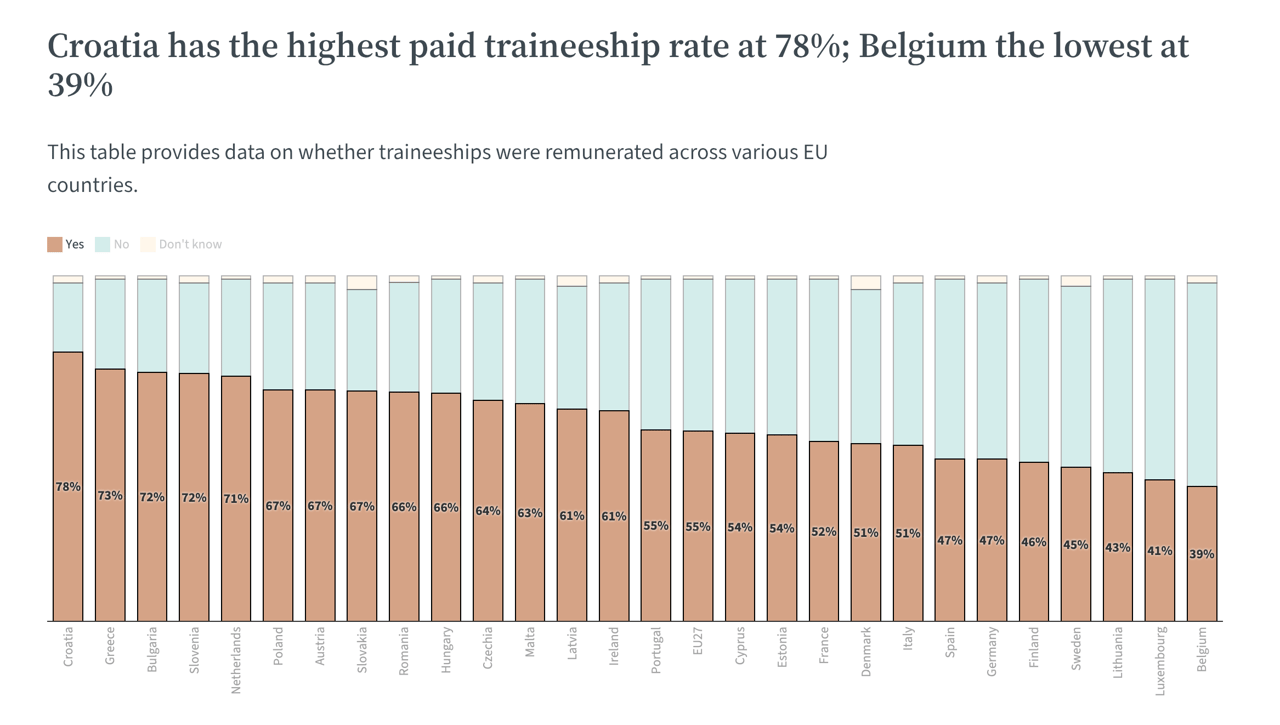The fight for fair traineeships across the EU
On Wednesday (8 October), the European Parliament adopted its position on fair traineeships in the EU, paving the way for negotiations with EU member states.
With youth unemployment being twice as high as the overall unemployment rate, traineeships are seen as a way to enter the labour market. There are over three million trainees in the EU, and the number is expected to rise by 16 percent by 2030.
In 2023, the parliament called on the European Commission to propose better conditions on traineeships in the bloc. In response, the commission brought forward the traineeship directive in March last year.
Last week, the committee on employment and social affairs finally agreed on a joint position. Now the plenary session in Strasbourg has adopted it as a mandate for inter-institutional negotiations.
MEPs say traineeships should be time-limited, focus on entry-level work, and be governed by a written agreement outlining pay, tasks, learning goals, and duration, with access to social protections like health insurance.
These rules should apply to all traineeships except those required for academic credit or formal apprenticeships. Unpaid or poorly structured traineeships lacking training or mentorship should be considered abusive, and organisations should appoint a contact person for trainee support.
Spanish socialist MEP Alícia Homs Ginel, the lead MEP in this file, said that said that payment for traineeships was at the centre of her work.
“We need minimum wages on that. When I talk on payment [for trainees] it's not like giving a compensation. No, I'm talking about payment,“ she told EUobserver.
For her, this should imply at least the national minimum wage, as well as social protection and access to trade unions working in the interests of trainees.
Polish centre-right Jagna Marczułajtis-Walczak, viewed it differently and stressed that the parliament doesn’t specify a level of payment to trainees: “it merely establishes the principle that interns should receive payment for their work.”

Opposition to the directive comes from small businesses. SMEunited is a European social partner representing employers. They are concerned that more administrative and financial burdens will be put on SMEs with little resources.
The SMEunited policy director Valentina Guerra told EUobserver that it was not clear in detail what “guidance and support for SMEs” meant — and that financial support is needed if the changes planned by the parliament will be implemented.
She further complained that the parliament's amendments would lead to “legal uncertainties” because they would blur the difference between a worker and a trainee.
For Slovenian MEP Irena Joveva, from the liberal Renew Europe, that is a key element. She said that recognising trainees as workers would guarantee social security and fair payment.
MEP Homs Ginel, however, explained that the goal is to keep administrative burdens for companies as low as possible in a bid to ensure that these traineeships are "fair". "That is not a cost. We cannot see that as a cost”.
After the adoption of the mandate by the parliament follows negotiations with the council, representing EU member states.
Tough negotiations are expected during the so-called trilogue meetings as the council’s position is viewed as “inflexible” and “not ambitious at all” by the MEPs EUobserver talked to.
Beyond all formal traineeships that are part of education, EU member states also want to exclude all those undertaken to help individuals find a job (which account for nearly 80 percent of traineeships).
Spain and Slovenia opposed the text, as they saw it as far too unambitious
Every month, hundreds of thousands of people read the journalism and opinion published by EUobserver. With your support, millions of others will as well.
If you're not already, become a supporting member today.
Author Bio
Hannah Kriwak is a junior reporter from Austria at EUobserver, covering European politics.
Tags
Author Bio
Hannah Kriwak is a junior reporter from Austria at EUobserver, covering European politics.